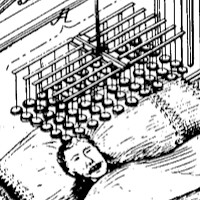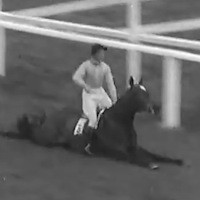Wordsworth Writes a Sonnet - September 3

It’s 5:30 or 6:00 in the morning in 1802. Budding poet William and his sister Dorothy are setting off by horse-driven coach from London to Calais, France. Dorothy, her brother’s constant companion, probably has a seat inside, but William is on the roof with the luggage. (It’s a cheaper fare.)
As the coach clips down Westminster Bridge, both turn to gaze at the city across the river. Dorothy will later recall the scene in her journal, but William immediately starts composing lines – the view is too inspiring to just pass by:
He would complete the sonnet on September 3, dating it incorrectly to the following year. You can view the original manuscript on the British Library website. Wordsworth corrected the title some three decades after it was published.
When he started it, he was engaged to Mary Hutchinson, a childhood friend with whom he and his sister had been in school. But first he and Dorothy went to Calais. They were going to visit Annette Vallon, the mother of his daughter Caroline.
William had first visited France during a walking tour of Europe, which he had embarked on with a friend before his final semester at Cambridge. Arriving in France on July 14, 1790, they discovered it was the first anniversary of the storming of the Bastille. William, only 20, was caught up in the revolutionary spirit. He returned to France the following year because he identified with the causes of the revolution and wanted to live and work and talk politics with “the common man.” It was then that he met and fell in love with Annette.
A year later, he had to leave before his daughter was born because he had run out of money. He had to get a job. By then he had published two volumes of poetry, Descriptive Sketches and An Evening Walk, both in 1793. Poetry, however, was not the career for a steady income.
He had intended to be ordained, but that plan fell through after his relatives found out about Annette. Instead, Wordsworth continued to write and develop his political views and poetic sensibilities. He gave voice to a love of nature and the passionate belief that poetry came from emotions and should be written in ordinary language.
Thus, he became a poet, at first dividing his time between London and the countryside. He and Dorothy were living in Dorset when he met Samuel Taylor Coleridge, with whom he formed a famous partnership. They published two editions of Lyrical Ballads, in 1798 and 1800, and traveled to Germany before falling out and ending their professional relationship.
Two years later, the debt that his father’s employer owed the Wordsworth family was finally paid in full, and William gained financial prospects. This allowed him to marry Mary Hutchinson, with whom he had five children and led a contented family life.
But first, he and his sister visited Annette and Caroline, staying in Calais for four weeks. Dorothy recorded her thoughts on the scene viewed from Westminster Bridge in The Grasmere Journal, which was published in 1897. Her brother borrowed freely from her writings to supplement his own observations; in fact, she devoted herself to supporting William’s career.
The sonnet is distinctive for its praise of an urban landscape in the heart of London as a showcase of natural beauty. The Industrial Revolution had been gearing up, and Romantic artists lamented the pollution of cities and pristine countryside alike. Wordsworth’s sonnet captures a moment when London is “smokeless,” her domes and spires steeped in a glittering, hushed sunrise a few hours before she must return to her daily hustle and bustle.
In time, Wordsworth grew out of his radical ways and became revered as a pioneer of Romantic poetry, becoming England’s poet laureate in his old age. But there is a poignant footnote to the story of the young, radical William:
In 1820, on their way home from a tour of the continent, William, Mary and Dorothy met Annette in Paris, along with Caroline, who was by then married. They went to the Louvre, and afterwards William visited the botanical garden with his French granddaughter, one of whose middle names was Dorothy.
As the coach clips down Westminster Bridge, both turn to gaze at the city across the river. Dorothy will later recall the scene in her journal, but William immediately starts composing lines – the view is too inspiring to just pass by:
Composed upon Westminster Bridge, September 3, 1802
Earth has not anything to show more fair:
Dull would he be of soul who could pass by
A sight so touching in its majesty;
This City now doth, like a garment, wear
The beauty of the morning; silent, bare,
Ships, towers, domes, theatres, and temples lie
Open unto the fields, and to the sky;
All bright and glittering in the smokeless air.
Never did sun more beautifully steep
In his first splendour, valley, rock, or hill;
Ne’er saw I, never felt, a calm so deep!
The river glideth at his own sweet will:
Dear God! the very houses seem asleep;
And all that mighty heart is lying still!
– William Wordsworth, from Poems, in Two Volumes (1807)
He would complete the sonnet on September 3, dating it incorrectly to the following year. You can view the original manuscript on the British Library website. Wordsworth corrected the title some three decades after it was published.
When he started it, he was engaged to Mary Hutchinson, a childhood friend with whom he and his sister had been in school. But first he and Dorothy went to Calais. They were going to visit Annette Vallon, the mother of his daughter Caroline.
William had first visited France during a walking tour of Europe, which he had embarked on with a friend before his final semester at Cambridge. Arriving in France on July 14, 1790, they discovered it was the first anniversary of the storming of the Bastille. William, only 20, was caught up in the revolutionary spirit. He returned to France the following year because he identified with the causes of the revolution and wanted to live and work and talk politics with “the common man.” It was then that he met and fell in love with Annette.
A year later, he had to leave before his daughter was born because he had run out of money. He had to get a job. By then he had published two volumes of poetry, Descriptive Sketches and An Evening Walk, both in 1793. Poetry, however, was not the career for a steady income.
He had intended to be ordained, but that plan fell through after his relatives found out about Annette. Instead, Wordsworth continued to write and develop his political views and poetic sensibilities. He gave voice to a love of nature and the passionate belief that poetry came from emotions and should be written in ordinary language.
Thus, he became a poet, at first dividing his time between London and the countryside. He and Dorothy were living in Dorset when he met Samuel Taylor Coleridge, with whom he formed a famous partnership. They published two editions of Lyrical Ballads, in 1798 and 1800, and traveled to Germany before falling out and ending their professional relationship.
Two years later, the debt that his father’s employer owed the Wordsworth family was finally paid in full, and William gained financial prospects. This allowed him to marry Mary Hutchinson, with whom he had five children and led a contented family life.
But first, he and his sister visited Annette and Caroline, staying in Calais for four weeks. Dorothy recorded her thoughts on the scene viewed from Westminster Bridge in The Grasmere Journal, which was published in 1897. Her brother borrowed freely from her writings to supplement his own observations; in fact, she devoted herself to supporting William’s career.
The sonnet is distinctive for its praise of an urban landscape in the heart of London as a showcase of natural beauty. The Industrial Revolution had been gearing up, and Romantic artists lamented the pollution of cities and pristine countryside alike. Wordsworth’s sonnet captures a moment when London is “smokeless,” her domes and spires steeped in a glittering, hushed sunrise a few hours before she must return to her daily hustle and bustle.
In time, Wordsworth grew out of his radical ways and became revered as a pioneer of Romantic poetry, becoming England’s poet laureate in his old age. But there is a poignant footnote to the story of the young, radical William:
In 1820, on their way home from a tour of the continent, William, Mary and Dorothy met Annette in Paris, along with Caroline, who was by then married. They went to the Louvre, and afterwards William visited the botanical garden with his French granddaughter, one of whose middle names was Dorothy.

Related Articles
Editor's Picks Articles
Top Ten Articles
Previous Features
Site Map
Content copyright © 2023 by Lane Graciano. All rights reserved.
This content was written by Lane Graciano. If you wish to use this content in any manner, you need written permission. Contact Lane Graciano for details.







